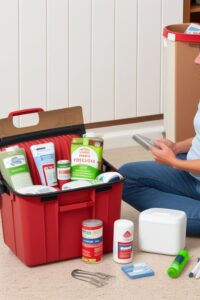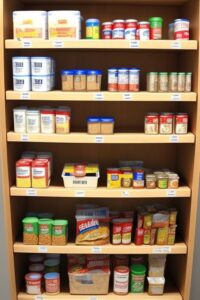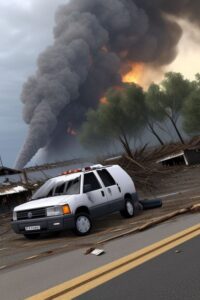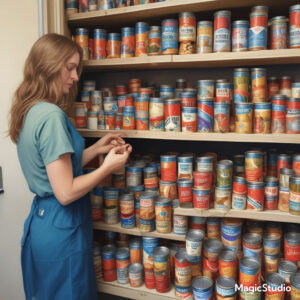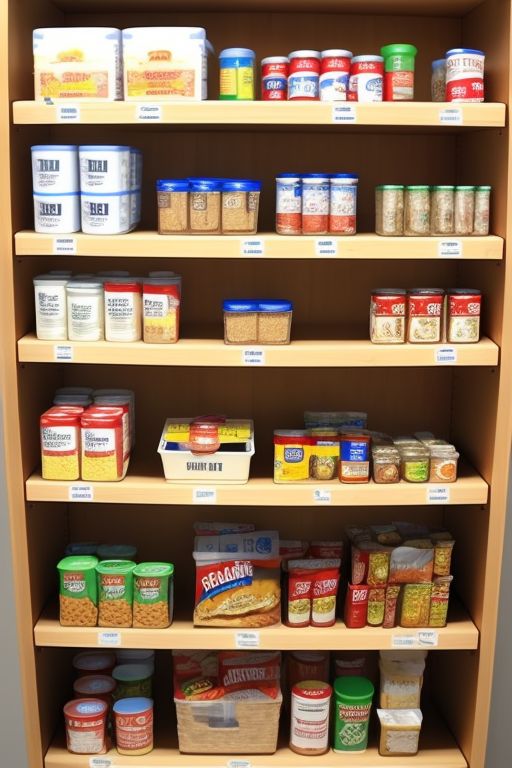
https://honest-patriot.com
In an increasingly unpredictable world, the necessity of stockpiling food and supplies cannot be overstated. Whether due to natural disasters, economic uncertainty, or political unrest, the potential for disruptions in the food supply is a constant threat that necessitates preparedness. Stockpiling essential items can act as a safeguard, ensuring that individuals and families are not left vulnerable in times of crisis. This article explores the critical reasons for stockpiling food and supplies, focusing on the potential interruptions caused by natural disasters, financial instability, and civil unrest.
Natural Disasters
Natural disasters are a primary reason to consider stockpiling food and supplies. Events such as cyclones, earthquakes, floods, and wildfires can devastate communities, disrupt supply chains, and render basic necessities inaccessible. In the immediate aftermath of a natural disaster, emergency services and supply lines may be stretched thin or entirely incapacitated. Having a stockpile of food and supplies can mean the difference between surviving comfortably and facing severe hardships.
Hurricanes and Floods
Hurricanes and floods can cause widespread damage, often leaving affected areas without power, clean water, or access to stores. The aftermath can lead to roads being blocked or washed away, making it difficult for aid to reach those in need. Stockpiling staple foods, bottled water, and essential supplies like flashlights, batteries, and first aid kits can help individuals weather the storm until help arrives.
Earthquakes
Seismic events can strike without warning, causing buildings to collapse and infrastructure to crumble. In such scenarios, grocery stores and other supply outlets may be destroyed or deemed unsafe. Having a stockpile of food, water, and medical supplies can provide the necessary support to survive until rescue operations commence and normalcy is restored.
Wildfires
Wildfires can force sudden evacuations, leaving little time to gather necessary supplies. In the wake of a wildfire, returning home to find stores closed or out of stock is a common scenario. A well-prepared stockpile can ensure that basic needs are met during such chaotic times, providing a sense of security and stability.
Economic Uncertainty
Financial instability can significantly impact the availability and affordability of food and supplies. Stockpiling can serve as a buffer against the fluctuations and hardships that often accompany economic downturns.
Inflation
Rising inflation can erode purchasing power, making it difficult for families to afford the basics. By stockpiling food and supplies when prices are stable, individuals can insulate themselves from the immediate effects of inflation, ensuring they have access to necessary items without straining their finances.
Job Loss
Economic uncertainty often leads to job losses and reduced income. In such situations, having a stockpile of essential items can provide a crucial safety net, reducing the need to spend limited financial resources on daily necessities. This can alleviate some of the stress associated with unemployment and allow families to focus on finding new employment opportunities.
Supply Chain Disruptions
Economic instability can also lead to supply chain disruptions, causing shortages of certain products. Stockpiling food and supplies can help mitigate the impact of these disruptions, ensuring that individuals have what they need even when stores are unable to restock their shelves.
Political Unrest
Political unrest, whether domestic or international, can lead to significant disruptions in the availability of food and supplies. Preparing for such scenarios by stockpiling essential items is a prudent measure.
Civil Unrest
Civil unrest can lead to curfews, roadblocks, and other restrictions that limit access to stores and essential services. In extreme cases, riots and looting can result in significant damage to retail outlets, leading to prolonged shortages. Having a stockpile of food and supplies can help individuals navigate these periods of instability without having to venture into potentially dangerous situations to secure necessities.
International Conflict
International conflicts can disrupt global supply chains, leading to shortages and price increases for various goods. For example, conflicts in key agricultural regions can affect the global food supply, making it harder to obtain certain products. Stockpiling food and supplies can provide a buffer against these international disruptions, ensuring that families have access to what they need despite global turmoil.
Government Instability
Government instability can lead to rapid changes in policies and regulations that affect the availability and distribution of goods. In such scenarios, having a stockpile of essential items can provide a measure of independence and self-sufficiency, allowing individuals to navigate periods of uncertainty more effectively.
Practical Steps for Stockpiling
Understanding the importance of stockpiling food and supplies is only the first step. Implementing a practical stockpiling strategy is crucial for ensuring preparedness.
Assessing Needs
Begin by assessing the specific needs of your household. Consider dietary restrictions, medical conditions, and other unique requirements. This will help you create a tailored stockpiling plan that meets your specific needs.
Non-Perishable Foods
Focus on stockpiling long-lasting food that have a long shelf life. Canned goods, dried beans, rice, pasta, and freeze-dried foods are excellent options. Be sure to rotate your stockpile regularly to ensure that the food remains fresh and consumable.
Water Supply
Water is critical for survival. Aim to stockpile at least one gallon of water per person per day for a minimum of two weeks. Consider investing in water purification methods, such as filters and purification tablets, to ensure access to clean water in case of extended emergencies.
Medical Supplies
Stockpile essential medical supplies, including first aid kits, prescription medications, over-the-counter medications, and hygiene products. Ensure that your stockpile includes items specific to your family`s health needs.
Emergency Gear
In addition to food and water, stockpile emergency gear such as flashlights, batteries, portable chargers, blankets, and multi-purpose tools. These items can prove invaluable during power outages and other emergencies.
Safe Storage
Store your stockpile in a cool, dry, and secure location. Use airtight containers to protect food from pests and moisture. Regularly check your stockpile for any signs of spoilage or damage and replace items as needed.
Conclusion
In a world marked by unpredictability, the importance of stockpiling food and supplies cannot be overstated. Environmental calamities, economic uncertainty, and political unrest all have the potential to disrupt the availability of essential items, making preparedness a critical component of personal and family safety. By understanding the risks and taking practical steps to build and maintain a stockpile, individuals can ensure they are well-equipped to face whatever challenges the future may hold. Stockpiling is not just about survival; it is about fostering resilience and self-sufficiency in an uncertain world

